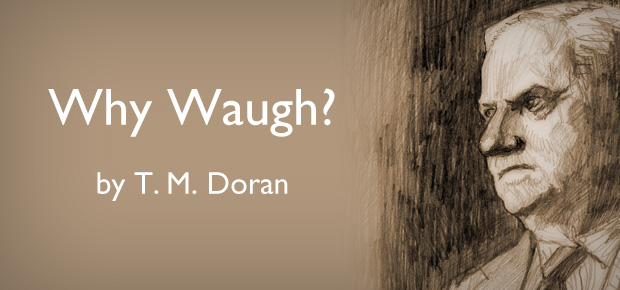
If you made a list of writers who are masters at storytelling, masters of humor, and masters of English prose, it would be a short list. One who belongs on this list is Evelyn Waugh.
British novelist and journalist, Evelyn Waugh, had three books listed among the Modern Library’s 100 Best Novels of the 20th century, but he doesn’t seem to be read by many today, even those in literary circles. Nonetheless, he is a masterful writer, able to evoke a broad spectrum of ideas and feelings with subtlety, poignancy, and humor.
I’m not an Evelyn Waugh scholar, expert, biographer, or anything of the sort, but I have read many of his novels, including those considered to be his best efforts: Brideshead Revisited, Scoop, Vile Bodies, and Handful of Dust, for both enjoyment and instruction in the art of writing, if such genius can be imparted.
One of the reasons for Waugh’s relative obscurity today, apart from the British society and events of his books belonging to another era, is his implicit rejection of nihilism, the lodestar for most “serious” authors since the 1960s. In other words, literature is now filtered through a nihilistic/materialistic prism. If it doesn’t pass this test, it may be rousing, interesting, and even masterfully composed, but it isn’t “serious” literature.
Waugh, by no means, told his readers what to believe or demonstrated “right behavior” with clumsy storytelling. On the contrary, Waugh’s stories are demanding, often undressing both characters’ and readers’ beliefs, in essence forcing them to go deeper into the walled gardens they have created for themselves. I enjoy a good mystery story and have read the Philo Vance mysteries by S.S. Van Dine (Willard Huntington Wright). Philo Vance, an early 20th century aesthete and materialist, wraps himself in a cocoon of pretense and self-assuredness. Waugh’s characters, on the other hand, are stripped of their cocoons, whether they realize it or not, some unfolding translucent wings and beginning to fly, others veering into a self-destructive flame.
Via satire, irony, parody, humor, and lost-ness, Waugh depicts the absurdity and narrowness of materialism, of dependence on wealth, status, prestige, and intellectual chauvinism. Nihilistic literature satirizes these things too, but in nihilistic literature there is no way out, while Waugh’s stories suggest a way out, even if characters ignore, reject, or ridicule it. Nonetheless, Waugh was conscious of, and careful about, overt moralizing, saying, “…a writer must face the choice of becoming an artist or a prophet. He can shut himself up at his desk and selfishly seek pleasure in the perfecting of his own skill or he can pace about, dictating dooms and exhortations on the topics of the day. The recluse at his desk has a bare chance of giving abiding pleasure to others; the publicist has none at all.”
Some have charged Waugh with anti-Semitism and racism. First of all, who among us (not me!) wants every word we have ever written and every word we have ever spoken scrubbed for evidence of bias? Those, like Waugh, with millions of words recorded in the public arena are particularly vulnerable to the PC inquisitors. We need to remember that Waugh was a masterful satirist, parodist, and humorist. How much of the bias reflected in his works reflects the satire and parody that embellish stories like Scoop, rather than his own beliefs?
Evelyn Waugh was a bold and honestly provocative writer, one of the best. He deserves to be read, today as in his heyday.






fonch
April 11, 2014 at 8:46 pm
Respect the accusation of the Evelyn Waugh was antisemitic is true, that he was accused to be antisemitic but really the most touching of his gallery of fictional characters with the exception perhaps of the lovely Cordelia Marchmain was a jewish character Madame Kanyi, who appeared in Unconditional Surrender. Evelyn Waugh has the Oskar Schindler`s complex in other short tale merciful Gordon other fictional character save Jews during the rise of Titus in Yugoslavia. I wish there was more writer antisemitic like Waugh the Jews would be happy, besides this accusation was done to Chesterton, Dorothy Leigh Sayers, Hilaire Belloc, and Anthony Berkeley, but when they need to be defended to the nazism the first writers to defend them were the authors i quoted i have never trusted in our prejudices. The article is excellent Mr. Doran.
T. M. Doran
April 16, 2014 at 4:08 pm
Thanks for your insights and kind words.
Catholic History Nerd
May 14, 2014 at 8:03 pm
Waugh is an all-time favorite of mine, so thank you for this call to appreciate his brilliant work! According to some biographical accounts Waugh could be an unkind person in his personal life, and the Wandering Jew scene in Helena does feel crass to our modern sensibilities. But the irony that even the master satirist is not beyond criticism makes the moral lessons of his biting prose all the more poignant.